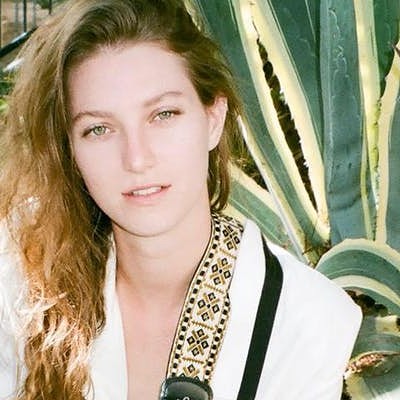Which is appropriate, because Jones' hometown (Augusta, Ga.) is the same place where the godfather of soul grew up, and she admits that as child, she tried singing like him. At least, that is, when she wasn't singing gospel in her local church or performing in school Christmas pageants.
"Basically, I guess I was 5 years old when I first sang, and it was 'Silent Night,'" Jones recalls during a recent phone interview from her home in New York City.
Jones, now 49, will visit Tucson with the Dap-Kings, her JB-style powerhouse funk and R&B band, for a gig Wednesday night, Sept. 14, at the Solar Culture Gallery.
Jones and the Dap-Kings have released two mind-blowing albums of vintage funk--good 'n' greasy, skeletal, from the gut and the soul--on the Brooklyn-based boutique label Daptone Records.
"We're trying to keep it alive--it's that soul music from the '70s and the late 1960s" she says. "It's the authentic sound, and it's real music. It's also energy, the steps and the whole thing. We try to portray that."
A former corrections officer at Rikers Island in New York, Jones hooked up with the Dap-Kings about nine years ago, when they were known as the Soul Providers. She was invited to sing on a recording session the Soul Providers were doing to back up veteran soul singer Lee Fields.
As Jones remembers it, "They were looking for three singers to do a little harmony. And I said, 'Why not let me do it by singing the three-part harmonies by myself?'"
The Dap-Kings constitute the house band for Daptone Records, which is owned by bassist-songwriter-producer Gabriel (Bosco Mann) Roth and tenor saxophonist Neal Sugarman. Many of the Dap-Kings are members of Antibalas Afrobeat Orchestra, which has proven to be a popular Tucson draw as well.
Jones says she enjoys playing the classic funk to audiences, whether they already are familiar with it or not.
"A lot of our audience is young college students. They come to me and tell me how they've never heard anything like it."
Others are familiar with the sound but thought it long lost to the capriciousness of time and trends.
In fact, the music editor of this publication, upon being given Jones' latest CD, Naturally, as a gift, gratefully told the giver that he didn't know that this sort of music was being made anymore.
From the packaging of Daptone Records releases (always available on vinyl as well as CD) to the charged atmosphere at a Jones show, this is all about evoking an era during which soul music pumped through listeners' veins like blood.
"Whether there's 10 people in the club, or whether there's 100, 200 people in the club, they're gonna get the same show; I'm not gonna give any less. Each time I'm performing, it could be my last, you know? If there are one or two faces looking up at me smiling, then you came to hear me, and that's what you're gonna get."
Jones and the Dap-Kings also recreate an environment in which movement, as well as music, acts as a joyful force of nature. She says, "I also show the audience how to do all the dances of way back then, such as the Bugaloo, the Camel Walk and the Pony."
Jones doesn't much care for today's Top 40 R&B, which she says sacrifices the essential ingredient of soul for a slick and vulgar surface appeal. "We don't mess around with that stuff--all the young guys with their stomachs showing out and grabbing their crotch, and the women with all their stuff hanging out."
Which isn't to say that Jones is averse to all contemporary music. She has recorded with the hip-hop/jazz DJ Greyboy. "If they have that certain sound of the true soul, or an appreciation for it, I want to work with them."
Jones is all about keeping it real, literally. "Artists today, they digitalize their vocals and stuff, and when they play on TV or on a stage, you realize they can't really sing. It's all enhancement to sell image."
Not surprisingly, Sharon Jones and the Dap-Kings have been getting no small amount of attention from listeners and press in Europe, where they sell most of their vinyl albums and 45-rpm singles (remember those?).
She appreciates the European passion for real-deal music from the United States. "Over there, they are just so laid back and relaxed about what they like. They're not affected as much by surface appearances. Here, when I was young, I was told I was too dark and too short to sing on TV. In Europe, they listen to the music and for them it's not about color or how you look. It's about sound."
Jones and the Dap-Kings also aren't afraid of expressing genuine opinions and convictions in their music. Sure, a torch song such as "How Long Do I Have to Wait for You?" can carry symbolic connotations outside of romance, but Jones also hits the stage with activist numbers such as "The Taxes," a radical screed on the Internal Revenue Service, and a treacherously grooving cover of Woody Guthrie's populist "This Land Is Your Land."
"Maybe a lot of people have heard this song a lot over the years, and maybe some haven't, and maybe some of them take it for granted and don't really hear it, you know? But it's asking you, 'Is this land really our land?'"
As many recording artists--from Marvin Gaye to Public Enemy--have proven, politics and funk don't have to be mutually exclusive. Jones concurs.
"When I'm singing, or talking to the audience between songs, I am purposefully expressing concrete ideas. I mean, I don't say hateful stuff or anything about hurting anyone, but I say whatever's on my mind. I'm an American, and I'm free to express myself."









